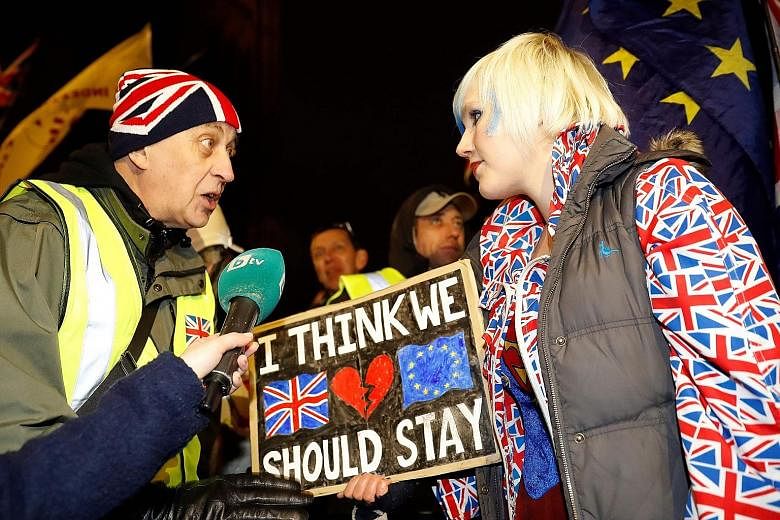LONDON • With Prime Minister Theresa May saying she will try to renegotiate the Brexit deal she herself struck with the European Union, it remains unclear how or when Britain will leave the EU.
Three ultimate scenarios remain: leaving with Mrs May's deal renegotiated or resurrected, leaving without an official agreement or no Brexit at all.
Here are the potential next steps.
TRY TO ALTER THE DEAL
MPs on Tuesday narrowly passed a government-backed amendment giving Mrs May a mandate to renegotiate her Brexit deal with the EU, after it was roundly rejected in Parliament earlier this month.
The key sticking point is the agreement's "backstop" solution to keep the Irish border open, which has the potential to leave Britain indefinitely tied to some form of EU Customs union.
Influential Brexit supporters have convinced Mrs May to swing behind the new strategy and try to get the EU to agree to legally binding changes to the backstop.
EU leaders have said they are willing to talk further, including on plans for the future trading relationship, but have repeatedly said they will not reopen the legally binding withdrawal agreement itself.
NO DEAL
Britain is legally on track to leave the EU with or without a deal on March 29, unless it delays or stops the process.
A no-deal scenario threatens to trigger a recession in Britain and markedly slow the EU's economic growth as well as causing significant legal disruption.
One of the world's biggest economies could lose preferential access to its largest export market overnight - affecting every sector, leading to rising costs and disruption at British ports.
DELAY
Speculation has been growing that the government will instead seek to postpone the Brexit process.
But other amendments introduced in Parliament on Tuesday to legally force a delay in Britain's departure date were rejected by MPs.
Political analysts argue lawmakers could still back such a postponement further down the line, although all the other 27 EU countries would have to agree.
A potential complication is that elections to the European Parliament are due in late May and the new chamber is set to sit on July 2. Some of Britain's 73 seats have already been reallocated.
SECOND REFERENDUM
Growing numbers of MPs are seeking a new referendum to reverse the 2016 result, when the Leave campaign won by 52 per cent to 48 per cent.
But supporters admit they currently do not have the numbers in Parliament to make it happen.
No law prevents Britain from doing it all over again but many question whether a revote would be democratic - or resolve anything. It also threatens to be just as divisive as the last one, with opinion polls showing the country is still split over the issue.
GENERAL ELECTION
Opposition Labour leader Jeremy Corbyn sought to oust Mrs May's government by calling a confidence vote after her Brexit deal was defeated, but she won.
There is a risk that her Conservative Party and their Northern Irish allies, the Democratic Unionist Party, could turn against her if she pursues either a "softer" or a no-deal Brexit. But if not, the only other way to force an election is for the Prime Minister herself to gamble and call a snap vote to break the impasse.
NO BREXIT
Some lawmakers favour the nuclear option of cancelling Brexit altogether, despite the threat of widespread public rage.
Speaking to business leaders on a conference call hours after Mrs May's deal was rejected by MPs earlier this month, Finance Minister Philip Hammond reportedly told them Article 50 could be "rescinded" to avoid the risk of a no-deal Brexit.
AGENCE FRANCE-PRESSE

